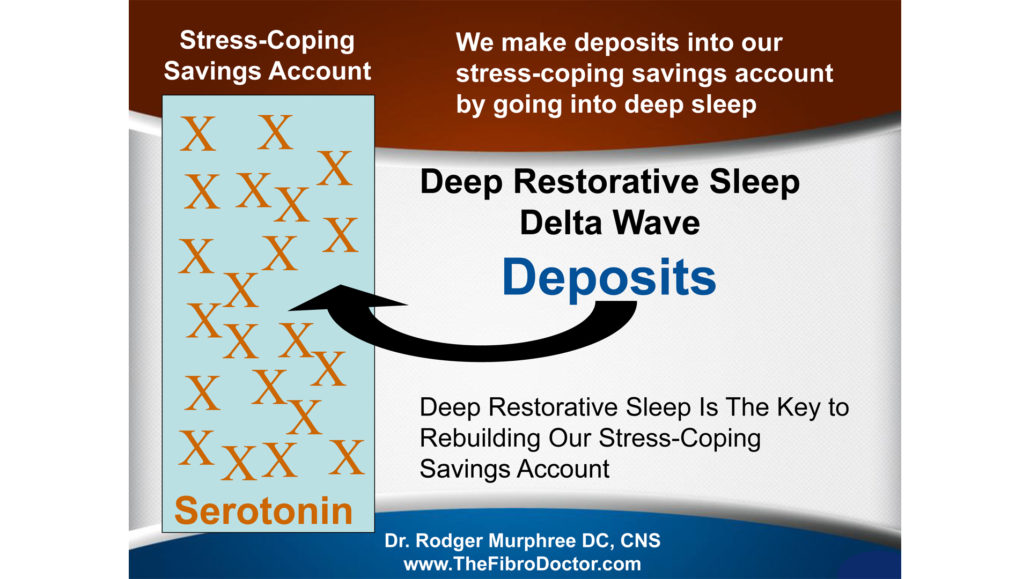Have You Bankrupted your Stress-Coping Savings Account?
We’re all born with a stress-coping “savings account” filled with chemicals—such as hormones, amino acids, and nutrients—that can be deposited and then withdrawn when needed. Depending on our genes, some of us have large accounts, and some of us have smaller ones. The more stress we’re under, the more withdrawals we make. If we make more withdrawals than deposits, we get overdrawn, and poor health quickly follows. Individuals with fibromyalgia and/or CFS have bankrupted their stress-coping savings account.
Although some patients bankrupt their accounts with one overwhelming event, most experience a series of stressful events over the years. These events typically involve stressful jobs, marriages, family dynamics, surgeries, illnesses, loss of a loved one, divorce, financial failure, etc.
For More Information about FREE Teleconference & Facebook Live Events – Register Now: www.EndFibroNow.com
Many of my patients can remember the day when their account went belly-up. It might have been after a surgery or following the loss of a parent. Whatever happened, the person was never the same from that point on; she just couldn’t get well. My CFS patients often relate how they came down with a bad case of flu and just never completely got over it. Once these individuals get enough rest and stop making withdrawals, they may attempt to do something as mundane as sweep the kitchen floor only to be wiped out once again. And forget about grocery shopping! That could put them in bed for weeks.
FMS and CFS are the result of internal biochemical (hormonal, enzymatic, neuronal, and chemical) imbalances that manifest themselves as physical symptoms (pain, weakness, and mental impairment). So in order to right the homeostatic system, you must correct the underlying biochemical problems. Just like an onion, you peel away one layer at a time until you get to the core. But we’ll discuss these practical steps soon. For now, let’s make sure that you understand all of these “layers of the onion.” One of these is dysautonomia.
Dysautonomia and the HPA Axis
Dysautonomia is defined by Taber’s Cyclopedic Medical Dictionary as “a rare hereditary disease involving the autonomic nervous system with mental retardation, motor in coordination, vomiting, frequent infections, and convulsions.” But dysautonomia symptoms are usually nowhere near this severe. Dysautonomia patients are more likely to be suffering from mitral valve prolapse and neurally mediated hypotension (dizziness upon standing) than mental retardation and vomiting.
HPA Axis automated blood pumping A better description, then, of dysautonomia would be a malfunction in the body’s master regulating (homeostasis) system, which—as you may recall from earlier chapters—is known as the autonomic nervous system or the HPA axis. The HPA axis (comprised of the hypothalamus, the pituitary gland, and the adrenal glands) controls millions of involuntary actions such as breathing, releasing of endocrine hormones, blood flow, smooth muscle tone, immune response, heartbeat, detoxification, and elimination. We don’t have to think about breathing; we just do it. We don’t try to pump blood through the heart and into the muscles; it is initiated and monitored by our HPA axis.
Normally all the systems in the body speak to and coordinate with one another. This is the essence of homeostasis. But when a person depletes her savings account of stress-coping chemicals, her HPA axis begins to self-destruct. This is dysautonomia. It’s as if the immune system starts to speak in Spanish, the endocrine system in German, the musculoskeletal system in Greek, and the digestive system in French! And when no one can communicate, chaos results!
Fibromyalgia And Your Stress Coping Account

Most of us can handle the ups and downs of our daily lives, even the occasional catastrophe. We dig in our heels, persevere, and eventually learn to cope. However, some individuals have an altered stress-coping system, which prevents them from managing daily stress. Human studies suggest that for some folks, the cumulative effects of physical, mental, chemical, or emotional burdens in early childhood may increase the effects of stress later in life. (It’s possible that the reason for his effect is an overstimulation or dysfunction of the HPA-axis). Retrospective studies show that the stress of emotional, physical, or sexual abuse during childhood also increases the future risk of developing certain symptoms, including many associated with FMS and CFS.
Apparently, for some children and adolescents, too many traumatic or stressful events decondition their normal homeostatic stress-coping abilities. Thus stress, particularly traumatic stress, early in life may alter the set point of their stress-response system. As they get older, have more responsibilities, and experience an increase in their daily stress, they often find their health beginning to suffer. They may start to have bouts of anxiety and depression, or perhaps they’re just tired all the time. They become extremely vulnerable to major stressors: the death of a loved one, chronic illness, invasive surgery, physical trauma, etc. Like a ticking time bomb, it’s only a matter of time before they explode.
This is especially true for those who have a genetic predisposition that makes them more susceptible to the ill effects of daily stress, including reduced serotonin levels. Some research has suggested that FMS/CFS patients may in fact by afflicted by this genetic abnormality.
Sadly, I find that many of my FMS and CFS patients have experienced physical, emotional, or sexual abuse as a child. Some patients report abuse from their spouse (sometimes physical but more often emotional). This stressful situation, though begun in adulthood, can still eventually deplete their stress-coping chemicals and lead to a state of disease.
The symptoms of fatigue, pain, poor sleep, poor digestion, irregular bowel movements, mental confusion, poor memory, anxiety, and depression are all warning signs that certain stress-coping chemicals (including vitamins, minerals, amino acids, essential fatty acids, and hormones) have become deficient. These deficiencies then complicate one another until the body’s homeostatic mechanism and HPA-axis become dysfunctional.
The final tick of the time bomb may be just another part of chronic daily stress, or it may be a sudden traumatic event like the birth of a new baby. I know I didn’t think I’d survive the first colic-plagued six months of my daughter’s life. And I’m extremely healthy! I pulled my weight and spent every other night walking and rocking my crying daughter into the early morning, and this is main reason it took another nine years before my wife could convince me to have another child!
It’s no wonder that many of my patients report that their fibromyalgia began after the birth of a child, often a firstborn. Anyone with children can relate to sleeping (if you can call it that) with one eye and two ears open, making sure the baby is breathing. Or how about trying to sleep without moving so that you don’t wake the baby up? Then there’s the endless nights of breast and bottle feedings, diaper changes at two in the morning, and the early morning piercing cry: “I’m awake, folks!” It’s enough to bankrupt anyone’s stress-coping savings account! Whew! Let’s move on.
Type A: The Driver

I’ve found that most of my FMS and CFS patients fall into one of two personality types: A or B. A’s are the driven perfectionists; they do, do, do, until they’re done out. Bs are the caregivers; they give, give, give, until they’re given out.
Type A’s have a schedule filled with activities, which may include a full-time job (which could be staying at home with kids), household duties, family responsibilities, soccer practices, PTA meetings, volunteer work, church duties, and more. They push themselves harder and harder trying to do more, be more, have more. They don’t want to settle for second best. These perfectionist can’t stand to be idle. They must be busy doing something, and they love to multitask. They’ll be talking on the phone counseling a co-worker, cooking dinner, emptying the dishwasher, feeding the baby, and looking over the day’s mail all at the same time. They’re used to pushing themselves and often feel guilty asking for extra pay or time off, even though they perform above and beyond their call. If asked to volunteer for a good cause, they nearly always accept. If the boss calls and asks them to head an additional committee, they accept once again. “No” is a rare word in their vocabulary.
Unfortunately, these type A’s can get so caught up in “doing” that they never take time to be human “beings.” They don’t know what true downtime feels like. Finally, the years of constant stress catch up to them, and they literally burn themselves out.
Type B: The Caregiver

Type Bs may or may not be as driven as type A’s, but they are just as taxed. They spend considerable time and energy taking care of spouses, children, extended family, and friends. Their lives revolve around the ups and downs and daily challenges of those they look after. They may have an invalid living in their home. They may be continuously running back and forth between the hospital and nursing home. Or they may just see it as their duty to especially care for those around them, even those who don’t ask for help. And since they don’t have enough time in the day to take care of the needy and themselves, they often struggle late into the night to get everything done.
They like to be needed (don’t we all?) and feel a sense of duty that makes them continue to give more. They can spend years giving and giving while getting little in return and leaving no time for themselves. This constant emotional strain can certainly take its toll on a marriage. They are often too tired to simply enjoy time with their spouse, who usually gets pushed to the bottom of the priority list (right above themselves, that is). Finally—and it’s inevitable—these individuals either change dramatically, or they crash.
As mentioned earlier, we are all born with a stress-coping savings account filled up with chemicals we need for the body to work properly. These chemicals—serotonin, dopamine, norepinephrine, cortisol, DHEA, HGH, and others—help us deal with stress.
Every time we are exposed to stress (chemically, emotionally, mentally, or physically), we make withdrawals from our stress-coping savings account. These withdrawals can be triggered by any stimulus, including sounds (especially loud or irritating noise), odors, and bright light. You may have noticed that the longer you’ve had your illness, the less tolerant you are to certain odors, chemicals, or noises.
Emotionally stressful situations cause the body to release adrenaline, cortisol, and insulin, and these stress hormones stimulate the brain to secrete serotonin. Long-term stress and poor dietary habits can therefore deplete the body’s serotonin stores. If we aren’t careful we’ll find that we are making more withdrawals than deposits, bankrupting our own account. And when we do, FMS and CFS are often the result.
But when a person enters deep, restorative sleep, she makes more serotonin, which then gets deposited into her stress-coping savings account. The more stress a person is under, the more serotonin she’ll need to replenish. It’s a vicious cycle. If she doesn’t have enough serotonin, she won’t be able to go into the stage of sleep in which she is able to make more serotonin!
Solving Your Serotonin Problem
The first reaction of many physicians to a patient’s serotonin deficiency is to recommend a selective serotonin reuptake inhibitor (SSRI) drug. But while prescription antidepressants can be helpful, they have some serious potential side effects (see chapter 6). In addition, they tend not to work for FMS patients. And here’s why: SSRIs can help a patient hang onto and use their naturally occurring stores of serotonin. They work like a gasoline additive would work in your car, helping to increase the efficiency of “fuel.” But most of the patients I see with fibromyalgia are running on fumes! A gasoline additive is not likely to help. If you don’t have any serotonin to re-uptake, then using a serotonin reuptake inhibitor drug is pointless.
And by pointless, I mean exactly that. It’s money thrown away. In fact, depending on which study you quote, from 19% to 70% of those taking antidepressant medications would do just as well on a placebo. This is precisely why I recommend that my fibromyalgia patients boost their serotonin levels by taking 5-HTP, not an antidepressant. Why put an additive in your gas tank…when you can just fill it up with what it’s really thirsty for?
The proper function of our adrenal glands is second only to a good night’s sleep in winning the battle against fibromyalgia and chronic fatigue syndrome.
The importance of restoring optimal adrenal gland function can’t be overstated. An individual with FMS or CFS who suffers from adrenal fatigue will find her stress-coping abilities to be severely depleted. Simply put, she “stresses out” easily. Consequently, she has to avoid stressful situations in order to just feel OK (which makes for complicated relationships). Stress causes her physical pain, worsens her other symptoms, and can cause a flare-up that lasts well beyond the time of the stressful incident.

If she has a day when she feel good, she’ll usually overdo it. Her reason? “I’ve got so much to do! And who knows when I’ll feel good again.” So she cleans the house, stays late at work, re-sods the front yard, goes Christmas shopping, and plays outside with the kids. Then she crashes—hard—the next day. She just doesn’t have any resistance to stress. If her sister calls at 9:00 p.m. with some bad news, she can just forget about sleeping. And of course she’ll feel terrible the next day, so she can go ahead and cancel that lunch date. “But how can I cancel on my friend again? She already thinks I’m avoiding her!” She just can’t make any firm plans, because she never knows if she’ll be having a good or bad day. Below are some sample accounts from patients of mine who have suffered from adrenal fatigue. Does any of it sound familiar?
Adrenal fatigue is already known to cause many of the same problems associated with CFS/FMS, such as muscle or joint pain, dizziness, fatigue, decreased mental acuity, low body temperature, a compromised immune system, depression, constipation, diarrhea, and abdominal pain.
For the past 14 years, I’ve successfully treated thousands of patients with high does of certain vitamins, minerals, amino acids, and other nutrients—an approach known as orthomolecular medicine (see ch. 7). It’s based solely on biochemistry, using the right chemicals inherently natural to your body’s optimal functioning.
In short, by using the natural building blocks that make up your normal biochemistry, we can correct, drastically improve, or even reverse the cause of your illness. Nutrients— including vitamins, minerals, and amino acids—make the hormones that regulate your body. They compose every essential chemical in the body, including thyroid hormone, testosterone, estrogen, neurotransmitters (serotonin, norepinephrine, etc.), antibodies, adrenaline, cortisol, and white blood cells.
Unlike with drug therapy, there is never any danger in getting healthy. Once you become familiar with my protocols, you’ll realize that they’re safer and often more effective than drug therapy alone. And they often work quickly, having a person feel better than she has in years.
These patients and hundreds of others who’ve worked personally with me have in fact beaten their fibromyalgia. You can read or listen to their stories by clicking the link below:
|
|








I actually have Dysautonomia also. I was diagnosed with a form of it called Neurocardiogenic Syncope in 2010, but have had it for 23 years. I was only diagnosed with Fibromyalgia about 2 weeks ago.